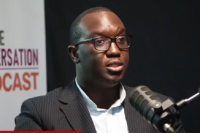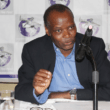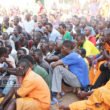Zambia Correctional Services Head of Legal unity Madford Chishimba says courts in Zambia are not utilising alternative sentences for minor offences as required by law, hence the congestion in prisons.
And Zambia Law Development Commission Executive Director Hope Chanda says the Commission is in the process of reviewing the Penal Code in order to decriminalise some of the criminal acts that have not been applied over the years.
The duo was speaking when they featured on ‘Let the People Talk’ programme on Radio Phoenix on Tuesday.
Chanda stressed the need for using other sentences such as pretrial release, and payment to fines in order to decongest prisons.
“Like studies have already shown that building additional prisons is not always the solution, we also need to look at other alternatives to imprisonment. Community sentencing, pretrial release, I think Mr Chishimba earlier on talked about issues and questions of bail, we need to look at those as well. In our legislation, we have got provisions for fines but in most cases the fines are high and the default is you go to prison. So it’s either we have to revisit the fines and come up with a little more realistic for people to pay so that we do not end up with the default of prisoners or we find alternative ways in which you can pay a fine. If you are found to have a debt at court for example, you are allowed to pay in instalments, that might be an option that we can apply to the fines,” Chanda suggested.
“We can also decriminalise some Acts, I am trying to think of some offences that we can decriminalise, I really cant think of anything other than bigamy right now, which might be a bit controversial. But truth be told, we do have the offence of bigamy seating on our books but in most cases, ‘how many people are you going to see reporting their spouses for marrying another?’ I mean polygamy is becoming part of our culture. So those are some of the things that we need to think about, we need to revisit our criminal legislation and look at some of those pieces of legislation that can be decriminalised. Actually the Zambia Law Development Commission is currently in the process of reviewing the Penal Code. So we hope that when we are done with that particular review, there can be some criminal acts that can be decriminalised that over the years, we have not applied.”
Chanda also said there was need to separate prisoners according to the categories of their crimes as that would determine the nature of rehabilitation programs such people would undergo.
“There is also need, according to jurisprudence on prisons and corrections, to separate prisoners also according to the categories of their crimes because this also determines the nature of rehabilitation programs that they will go into. And now we are going into another process of reviewing the laws and the Commissioner General’s regulation which govern the daily running of prisons. I think the problems are seating in the criminal justice system as a whole. The judiciary does have its limitations in terms of availability of court rooms which affects access to the court system for people that find themselves in conflict with the law,” she said.
“But when you look at the bigger criminal justice system in addition to that, you also have inability to access legal representation or legal services which is very key. In most cases if you find someone appearing before court, when they have a lawyer and they have someone representing them, their matters tend to move a little quicker, mostly because they have someone that understands the system, they have got someone who understands the law and that is able to push things for them . But in most cases as we know, legal fees are not cheap, it’s quiet costly. And most people that find themselves in conflict with the law come from the lower end of the social bracket. So of course getting a lawyer is quiet difficult.”
Chanda further noted that there were inadequate financial resources which the Legal Aide Board was grappling with which affecting its proper functioning.
“Secondly, our legal aid system is inadequate. The constitution does provide that in an event that you cannot get a lawyer of your own choosing, the state must provide you with a lawyer and we’ve got the Legal Aide Board that has been established for that. Sadly it is also grappling with financing and inadequate resources, inadequate lawyers. In most of the provinces they actually have maybe one-two members of staff and they have tried to beef-up their staffing. But the numbers are so low, most times they are restricted mostly to dealing with serious criminal offences,” Chanda said.
Meanwhile, Chishimba noted that high bail conditions were contributing to congestion in the prisons.
“One of the inadequacies in the judicial system is delay in disposing off of cases and I think it is because of adjournments. These adjournments sometimes they come from the prosecutors or the defence. Sometimes its the judges or the magistrates. Another thing is also the bail conditions, the conditions that are demanded for someone to go on bail. You find that they will demand for working sureties and also some monies where most of our inmates coming from humble families and they are failing to meet these conditions therefore we are having a number of inmates who would have been appearing before court outside but they are in prison because of the conditions,” observed Chishimba.
“Also our courts are not using alternative punishments, alternative sentences as required by law especially to do with minor offences, so I think that needs to be looked at. But of course there is tremendous improvement of our judicial system.”












